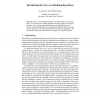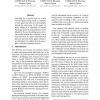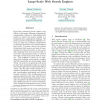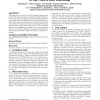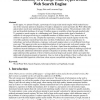186
click to vote
CORR
2012
Springer
13 years 9 months ago
2012
Springer
A typical web search engine consists of three principal parts: crawling engine, indexing engine, and searching engine. The present work aims to optimize the performance of the cra...
144
click to vote
SEMWEB
2011
Springer
14 years 4 months ago
2011
Springer
In this tool report, we present an overview of the Watson system, a Semantic Web search engine providing various functionalities not only to find and locate ontologies and semanti...
124
click to vote
ECIR
2011
Springer
14 years 5 months ago
2011
Springer
The User-over-Ranking hypothesis states that rather the user herself than a web search engine’s ranking algorithm can help to improve retrieval performance. The means are longer ...
143
click to vote
ACL
2009
14 years 12 months ago
2009
Searching for a person name in a Web Search Engine usually leads to a number of web pages that refer to several people sharing the same name. In this paper we study whether it is ...
163
click to vote
VLDB
2002
ACM
15 years 1 months ago
2002
ACM
Given that commercial search engines cover billions of web pages, efficiently managing the corresponding volumes of disk-resident data needed to answer user queries quickly is a f...
141
click to vote
SIGIR
2002
ACM
15 years 1 months ago
2002
ACM
This paper gives an overview of the evaluation method used for the Web Retrieval Task in the Third NTCIR Workshop, which is currently in progress. In the Web Retrieval Task, we tr...
124
click to vote
JSS
2002
15 years 1 months ago
2002
This paper presents an architectural design and evaluation result of an efficient Web-crawling system. The design involves a fully distributed architecture, a URL allocating algor...
141
click to vote
CN
1998
15 years 1 months ago
1998
In this paper, we present Google, a prototype of a large-scale search engine which makes heavy use of the structure present in hypertext. Google is designed to crawl and index the...
122
click to vote
SIGIR
2008
ACM
15 years 2 months ago
2008
ACM
Personalization of web search results as a technique for improving user satisfaction has received notable attention in the research community over the past decade. Much of this wo...
130
click to vote
SIGIR
2008
ACM
15 years 2 months ago
2008
ACM
Any given Web search engine may provide higher quality results than others for certain queries. Therefore, it is in users' best interest to utilize multiple search engines. I...

